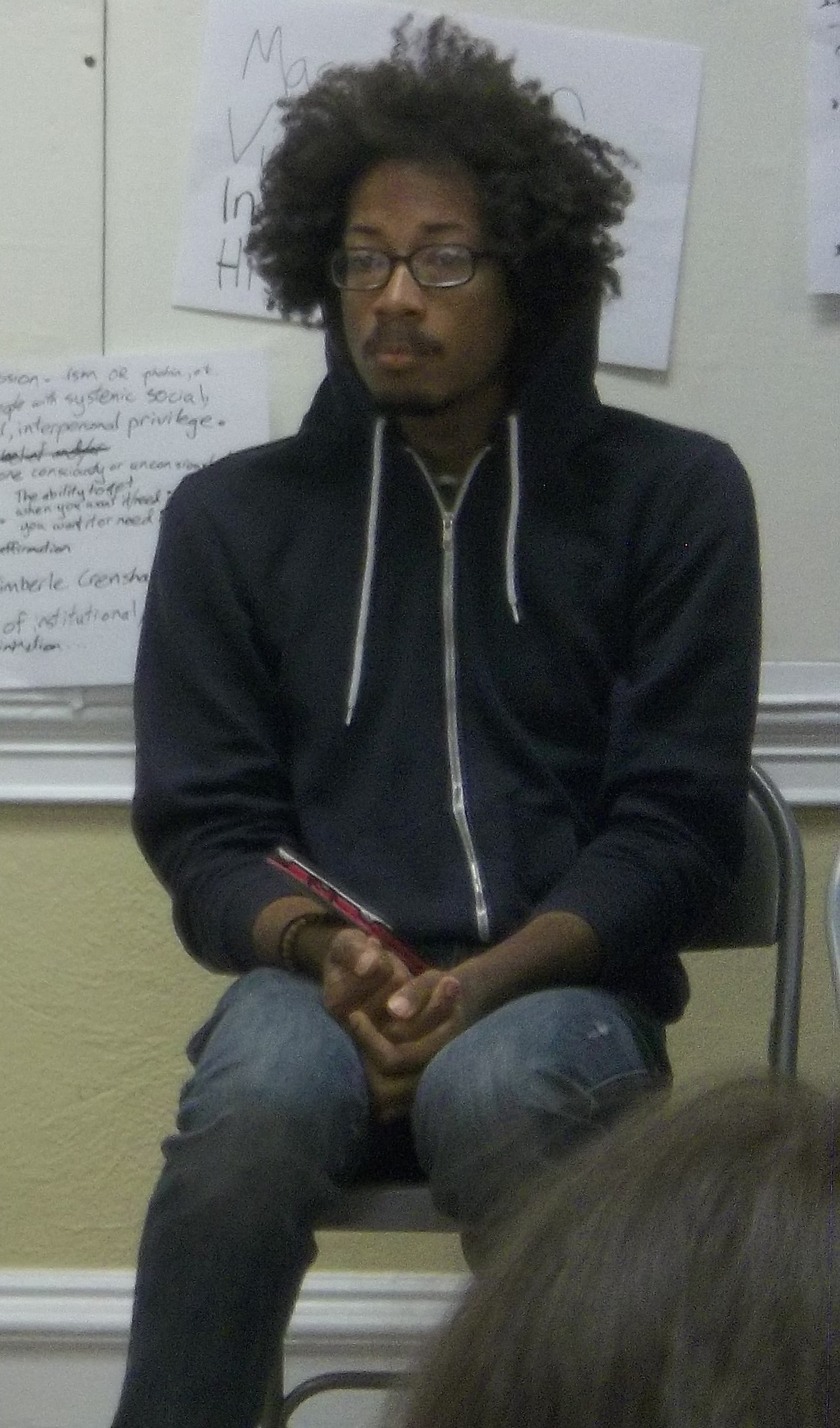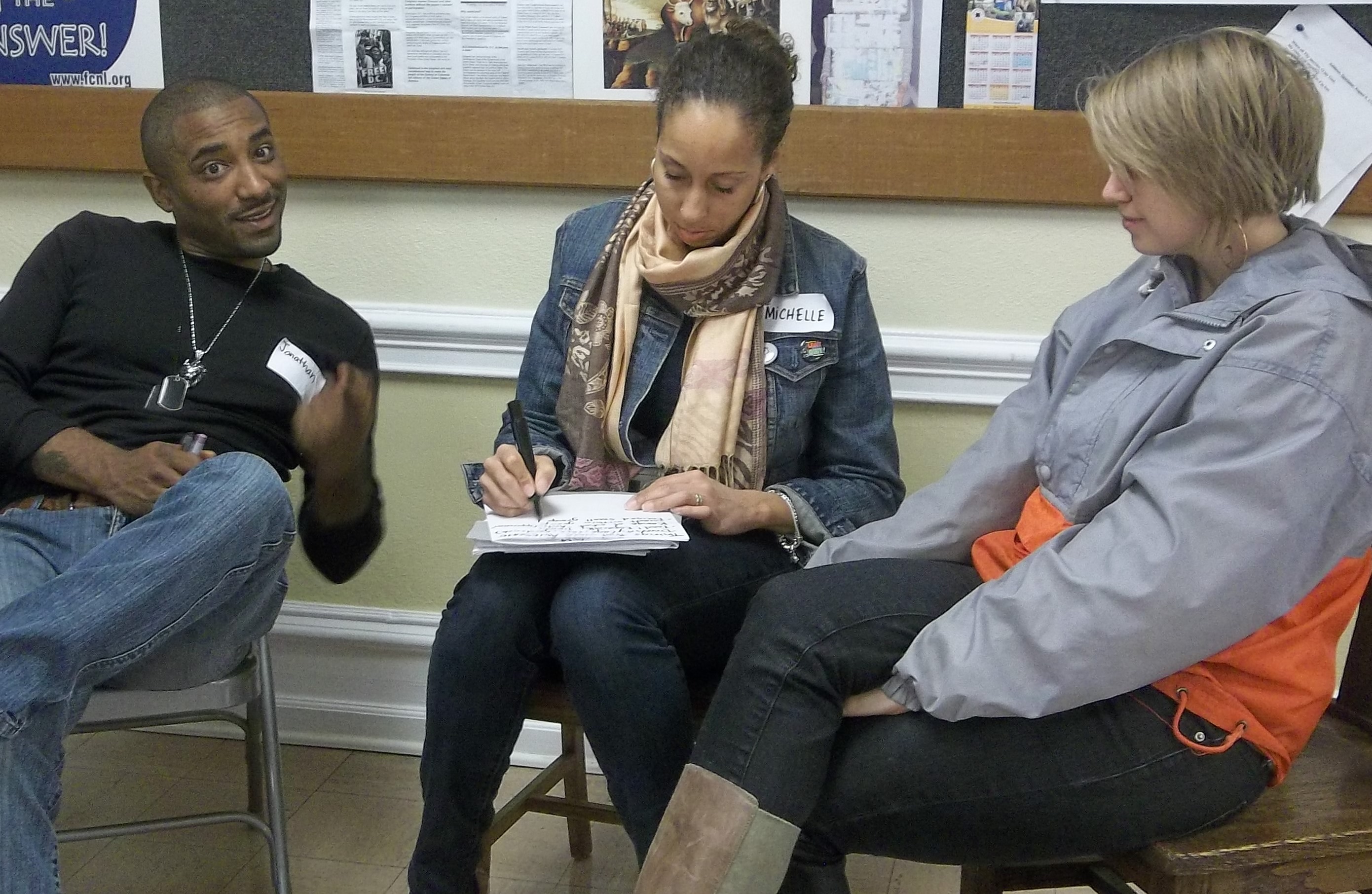
Power – the ability to transform yourself + the world around you through expression, connection, love +community towards a shared vision
This definition was one of many powerful contributions that came out of our day-long anti-oppression facilitators gathering last week. The Washington Peace Center, along with the DC Trainers Network, spent much of our early spring working on reaching out and networking across the city to learn about who’s doing work grounded in a collective liberation, intersectional approach to ending oppression.
Intersectionality- embodiment of layers, “We don’t have single issue struggle because we don’t live single issue lives” – Audre Lorde
AND/OR
Intersectionality- The relationship between the many identities we carry that are connected to systems of affirmation or marginalization
AND/OR
Intersectionality- Term originated by black feminist scholar, Kimberlé Crenshaw
 On Saturday, April 5th, activists and community members from across the DMV gathered at the Friends Meeting House of Washington (WPC’s first home) to come together around shared language, analysis, struggles, and resources. oppression, collective liberation, “isms”, and intersectionality. Folks brought their own analysis and experiences to build a common language, with important pressing questions like “is privilege necessarily unearned?” “does unearned span across generations?” and critical additions like insisting that we honor black feminists like Kimberlé Crenshaw who gave the term intersectionality breath.
On Saturday, April 5th, activists and community members from across the DMV gathered at the Friends Meeting House of Washington (WPC’s first home) to come together around shared language, analysis, struggles, and resources. oppression, collective liberation, “isms”, and intersectionality. Folks brought their own analysis and experiences to build a common language, with important pressing questions like “is privilege necessarily unearned?” “does unearned span across generations?” and critical additions like insisting that we honor black feminists like Kimberlé Crenshaw who gave the term intersectionality breath.
After a lovely lunch break, complete with soccer balls and sunshine in the beautiful Friends Meeting House courtyard, we came back to small groups broken up into focus areas for folks who work in the scope of community organizing, institutional shifts, personal transformation, and youth work. Each group was tasked with making a list of what they’re really good and what resources they have access to in their scope of work and where their struggles lie. After some strategic rotating, everyone was able to make comments about possibilities for sharing resources and collaborating in the  future.
future.
At the end of what felt like a very quick day, we came together again to ask the question “what roll do facilitators play in anti-oppression work.” With answers ranging from deepening analysis of Nonviolent communication to hosting a weekend skillshare for anti-oppression trainers. One participant pointed out that facilitators have the opportunity to build a microversion of the world we’re collectively looking to build in a contained space, and others pointed out that collecting information around upcoming trainings and learning from other people’s practices were essential.
We were able to bring together facilitator-activists from projects across the city working on a variety of  issues including (but certainly not limited to), disability justice, trans liberation, educational justice, eradicating racism, empowering youth, and so much more. The room was filled with passion, but it’s important to note one of the major limits of the day; and the similarly scheduled Ni Una Mas! Immigration Reform rally, we didn’t have representation from that major social movement. However, by building strategic connections needed to strengthen the larger foundation of anti-oppression work in the city, we see our work as inherently in solidarity with struggles for immigration justice. We believe that this work will help strengthen the impact of the rally, and will work to reach out to folks doing immigrant justice work
issues including (but certainly not limited to), disability justice, trans liberation, educational justice, eradicating racism, empowering youth, and so much more. The room was filled with passion, but it’s important to note one of the major limits of the day; and the similarly scheduled Ni Una Mas! Immigration Reform rally, we didn’t have representation from that major social movement. However, by building strategic connections needed to strengthen the larger foundation of anti-oppression work in the city, we see our work as inherently in solidarity with struggles for immigration justice. We believe that this work will help strengthen the impact of the rally, and will work to reach out to folks doing immigrant justice work
Participants are eager to think through next steps and future possibilities for this group, and what a coordinated community of anti-oppression facilitators and activists can do with some organization, commitment, and connection.
- Log in to post comments
